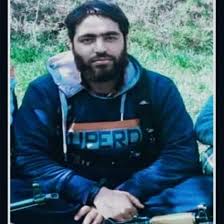
Dr. Saifullah Mir: A Legacy of Sacrifice and Resistance
Muhammad Shahbaz
Dr. Saifullah Mir has fulfilled the promise he made with his Creator—a promise that drove him to leave behind the comforts of life and adopt the wilderness as his abode for six long years. Born in 1989 in the village of Malangpora, Pulwama, in the home of a school teacher, Mohammad Akram Mir, Saifullah entered the world at a time when Jammu and Kashmir was ablaze with resistance against India’s illegal occupation.
Saifullah completed his early education in science within his native region and earned a diploma in biomedical engineering from the Industrial Training Institute in Pulwama. His academic journey continued at the National Institute of Electronics and Information Technology in Srinagar, where he worked as a technician for three years. Later, he served as an instructor in a local institute and even applied for a job at the prestigious Sher-i-Kashmir Institute of Medical Sciences (SKIMS) Soura, where his technical expertise earned him a position.
Despite his stable career and financial prospects, Saifullah felt an unrest stirring within his heart—a deep yearning to dedicate himself to a greater cause. On October 8, 2014, he left behind his worldly aspirations and joined Hizbul Mujahideen, a native pro-freedom resistance organization in the region. Equipped with technical knowledge and a sharp intellect, Saifullah quickly found his purpose. This was an era when Burhan Wani, a charismatic leader, was inspiring Kashmir’s youth to join the movement for freedom. Burhan’s powerful messages resonated across the region and inspired youth to rise against oppression. Saifullah, too, was deeply influenced by Burhan’s vision, which emphasized sacrifices for the liberation of Kashmir.
Saifullah’s upbringing in a household steeped in moral and ethical values shaped his path in Hizbul Mujahideen. Over the years, he transformed into a resolute and strategic leader. Following the martyrdom of Burhan Wani in 2016 and subsequent leaders like Mohammad Yaseen Ittoo (Mahamood Ghaznavi) and Riyaz Naikoo, Saifullah was appointed Hizbul Mujahideen’s Operational Chief. Before this role, he had served as the district commander for Pulwama, earning a reputation for meticulous planning and great commitment.
As a leader, Saifullah prioritized uniting his comrades and ensured their needs were met, and preparing them for resistance against the Indian occupation. His dedication and strategic acumen placed him on the Indian intelligence agencies’ most-wanted list, ranking second only to Riyaz Naikoo. Recognized as a “Category A++” armed fighter, Saifullah became a symbol of resistance, revered by his followers and feared by his adversaries.
Saifullah’s medical knowledge and care for wounded comrades earned him the title “Dr. Saif.” His ability to inspire and organize his men made him an invaluable asset to Hizbul Mujahideen. Despite relentless pressure from Indian forces, Saifullah remained steadfast while inflicting heavy losses on the occupying army and its collaborators.
On November 1, 2020, Saifullah’s journey of resistance reached its culmination. In a fierce gunfight in Rangreth, Srinagar, he fought valiantly against Indian occupying forces. Trapped in a residential house under siege, Saifullah refused to surrender, embodying the spirit of his predecessors. Alone, he held off the enemy for hours and ultimately chose martyrdom over captivity or surrender. Indian forces, unable to overpower him directly, resorted to destroying the house where he was entrenched. The news of his martyrdom spread quickly, sparking protests and clashes as youth gathered at the site, chanting slogans against Indian oppression and in support of freedom. Following his martyrdom, the Indian authorities buried him far from his native village, in a graveyard under their control in Baramulla. This act, intended to deny Kashmiris the chance to honor their hero, only deepened the people’s resolve. They have been burying the resistance fighters far away from their ancestral villages since 2019, often denying them a proper Islamic burial and preventing their family members from participating in their funerals or even see the faces of their loved ones one last time.
Dr. Saifullah’s life and sacrifice exemplify the spirit of the Kashmiri struggle for freedom. Despite opportunities for a prosperous life, he chose the path of resistance and dedicated himself to the cause of liberation. His leadership not only strengthened the organizational structure of Hizbul Mujahideen but also inspired countless others to join the movement.
The sacrifices of Saifullah and countless others are a testament to the resilience of the Kashmiri people, who have faced decades of occupation and oppression. Lakhs of lives have been lost, thousands have been orphaned, widowed, or disappeared, and entire villages have faced devastation. However, the struggle continues, passed down from one generation to the next.
May Dr. Saifullah’s sacrifice be accepted by the Almighty, and may his legacy guide the Kashmiri struggle for liberation until its ultimate success. Aameen
This article was translated from Urdu by Idrees Bhat



